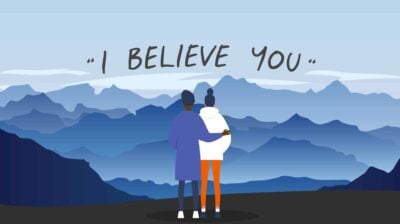Quiz: Can you recognise sexually violent behaviour?


Sexual violence is normalised and common in our culture and in our society. There are a lot of behaviours that people experience in their day-to-day life that you might not realise are considered sexual harassment and violence.
In order to tackle this issue, we need to recognise and understand all the ways to people experience sexual violence in their lives. Take this quiz to see if you can identify sexually violent behaviour.
Q1: True or false: Sexual violence only refers to sexual assault
Sexual violence covers a wide spectrum of behaviour, from sexist jokes and catcalling to sexual assault and rape. Any form of sexual violence is wrong and can make the person who experiences feel uncomfortable and unsafe. Everyday behaviours, like making sexist jokes, need to be tackled in order to address the issue fully.
If you see sexual assault or harassment, it’s only a good idea to intervene if:
If you witness sexual harassment or sexual assault, it’s important to find ways to intervene safely. It can sometimes be hard to know what to do as a bystander, but there are ways you can step in to help the person experiencing harassment or assault. Find out more on what to do if you see sexual violence.
If your date seems to be drunk, what is the best thing to do?
When a person is drunk, they’re more likely to do things they wouldn’t do if they were sober. A drunk person cannot give consent, and sexual activity with a person who doesn’t know what’s happening and can’t freely consent is sexual assault. Always look after drunk dates or friends, and make sure they get home safely.
Which of the following is considered sexual violence?
All of these behaviours are considered sexual violence. Many people experience these things in everyday life, but just because they can be considered common or ‘normal’, doesn’t mean that they’re okay. These experiences can make people feel unsafe.
True or false: Sharing someone’s nudes without their consent is sexual violence
Sharing another person’s intimate images without their consent is call image-based sexual abuse, and is another form of sexual violence. This is a huge violation of trust, can seriously impact on the person’s mental health, and it is illegal, with a punishment of prison and/or a fine of up to €5,000. If the person in the image is under 18, this is considered child exploitation, and having a picture or video of someone under 18 can lead to criminal prosecution.
Which if the following is okay to do without someone’s consent:
It is always essential to make sure that you have another person’s consent before entering someone’s personal space or engaging in any sexual activity, and this includes kissing. Consent means both people involved are completely comfortable with what’s happening and are able to consent (ie not drunk or high, not being taken advantage of by someone in a position of power over them, or underage). If a person says no, you must respect that. However, even if they don’t say no out loud, they may be showing that they’re uncomfortable in other ways, for example with their body language, by moving away from you, or by trying to divert your attention to something else. Always ask if they’re okay with what you’re doing. The legal age of consent in Ireland is 17, which means that even if a person under 17 has consented to sex themselves, their consent is not considered legally valid because they are underage.
True or false: Only women experience sexual violence
Sexual violence can happen to anyone, of any gender and at any age. If you have experienced sexual violence, there are support organisations available to help.
If someone catcalls you on the street, this is...
Catcalling, beeping a horn at someone walking down the street, commenting on a passerby’s looks and other forms of street harassment are a form of sexual violence, and can make the person experiencing it feel incredibly uncomfortable and unsafe. This is never okay, and it’s important to challenge this behaviour when you can.
When a friend makes a dirty or inappropriate joke in a group setting, it’s best to...
In order to tackle the issue of sexual violence, we need to challenge people’s attitudes and speak up when we hear or see things that we know are not right. If something happens in a group setting, you can calmly say that you didn’t feel what they said or did was right, or you can reach out to them privately to talk about it one-to-one. You may feel nervous or uncomfortable at first, but in time you will find it easier to speak out.
Repeatedly asking someone for their number or to go out with you..
If a person isn’t interested in going out with you, you must respect that and move on. Although it can be disappointing, it’s better to invest your energy in finding the right person for you instead of trying to make someone else like you. If you keep pestering someone, this is considered harassment.






